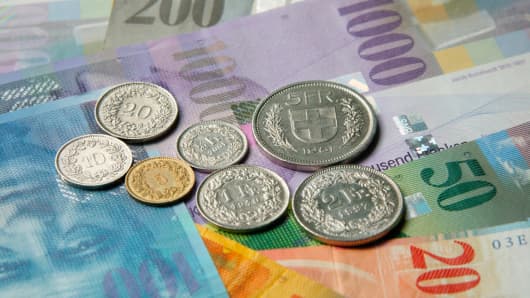The Swiss National Bank is opening a branch in Singapore to allow for round-the-clock management of its foreign exchange reserves, which it needs to tap to defend the safe-haven franc from over-heating.
The SNB, which imposed a 1.20 per euro limit on the soaring franc in 2011 to prevent a recession and deflation, has had to intervene heavily to keep the lid on the currency, swelling foreign exchange reserves to 72 percent of national output.
"A local presence will allow the SNB to extend its coverage of markets in Asia, and will facilitate its round-the-clock operations on the foreign exchange market - for example, to enforce the minimum exchange rate," it said in a statement.
The SNB said the move also came against the backdrop of attempts to diversify its investments, currently largely held in highly-rated government debt in euros, dollars and pounds sterling.
Its holdings of other currencies - including Swedish and Danish krona, Australian and Singapore dollars, and South Korean won - rose to 4.2 percent of its portfolio in the third quarter from 3.4 percent the previous quarter.
An easing of market tension in the euro zone since September has seen the franc weaken towards 1.21 per euro, stemming the need for the SNB to intervene and allowing it to diversify out of euros.
"Further investment opportunities are also being examined - this includes both bonds and equities," the SNB said on Tuesday. The SNB increased its equity holdings to 12 percent in the third quarter from 10 percent.
The central bank said at its quarterly monetary policy meeting last week it was determined to keep a lid on the franc, adding the diversification of its foreign currency investments was its sole means of reducing exchange rate risk.
The SNB said it chose Singapore to set up its branch - set to open in mid 2013 with seven staff members - because it was one of the largest financial marketplaces in the region and close to a number of emerging economies.


